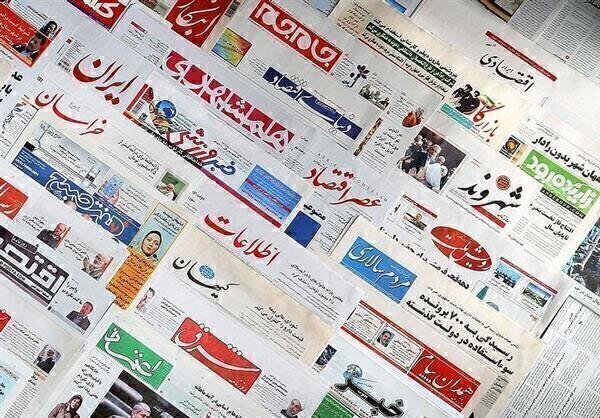Tehran Papers

Hamshahri devoted its editorial to the Sultan of Oman’s visit and said: “During his visit to Tehran, the Sultan of Oman carried two messages from the United States and three European countries, England, France and Germany, and these two messages can definitely help break the deadlock in the Vienna negotiations.”
Since the United States and three European countries have well understood that the use of pressure and sanctions cannot force Iran to surrender in the face of greed by the United States and Europe, they are trying to send positive signals to Tehran. The Europeans hold the view that returning all parties to the negotiating table and reaching a new agreement can end the West’s concerns about Iran’s nuclear activities and pave the way for more interaction between the Islamic Republic and European countries. To express their goodwill, the European countries released, a day before the visit of the King of Oman, the Iranian diplomat Mr. Asadollah Asadi, who was imprisoned in Belgium for 5 years on fake charges. In such a process, it seems that both the United States and the 3 European countries - England, France and Germany - are trying to return to the negotiating table in Vienna because the options of sanctions and threats against Iran have lost their effect.
Ham Mihan: Disconnection with Egypt is meaningless
In an analysis, Ham Mihan discussed Tehran’s green light for renewing relations with Cairo. It wrote: Every decision should be corrected in the new time and place and not allow the relations between the two countries make worse than now. If it happens, people will be pessimistic of authorities. Whatever had happened is finished. Severance of ties with an important country like Egypt for 44 years is meaningless. The interesting thing is that there has not been much change in regional issues that makes the new relations more justifiable compared to the past. In other words, such a change should have taken place long ago.
Donya-e-Eqtesad: De-dollarization in favor of Iran’s trading partners
In a note, Donya-e-Eqtesad wrote: For a country like the Islamic Republic of Iran, due to the policies of the United States and its long sanctions against Iran’s economy, de-dollarization of foreign trade is necessary. But it should be noted that the continuation and strengthening of this policy necessitate strengthening the value of the national currency. Economic instability and continued weakness of the national currency will make people and economic actors to rely on international currencies to protect the value of their assets. De-dollarization without a plan to control volatility and economic instability may lead people to turn to other stable currencies that are linked to the dollar because of the existing limitations to obtain and to hold the dollar. For example, the dirham of the UEA and the euro (the world’s second most valuable currency) when America intends to tighten limitations on Iran, will put indirect pressure through these currencies. Therefore, trade in national currency entails controlling inflation and stabilizing the value of the national currency, otherwise an intermediary currency will be needed for trade settlement with countries, and it will actually benefit Iran’s trading partners.
Sobh-e-No: “Zero tension” policy in West Asia
Steps such as improving relations with Iran, which go against the wishes of the U.S. and the Zionist regime, are easily being taken today by the regional countries, Sobh-e-No wrote. Of course, the paper said, Tehran and Cairo have already agreed on important regional issues, and this alignment of positions makes the way for normalization of relations smoother, just as Egypt neither supported the enemies of the Assad government in the Syrian war nor took side in the Yemen war.
Now, according to the “zero tension” policy, disputes among the countries of the region are coming to an end. This policy will reduce tension and strengthen stability in the region by establishing good relations with all parties and untying tight knots in relations between countries. With such a policy, the only main loser is the Zionist regime and the main winners are the Muslim nations of the region that can speed up the path of development and establish regional security and stability without the interference of foreigners, and prevent the formation of devastating wars imposed by the West in their geography.

No comments:
Post a Comment